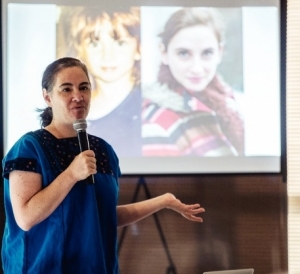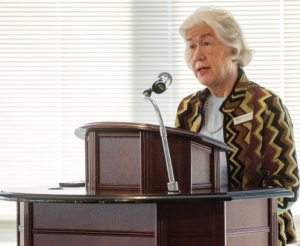Learning from birth
By Phyllis Moore
Published in News on November 18, 2016 10:02 AM

News-Argus/SETH COMBS
Dr. Mariana Glusman, assistant professor of pediatrics at Northwestern University, speaks about the impact that a child's neural pathways have on their development and the importance of early reading to help with language acquisition on Thursday at the Lane Tree Conference Center. Behind Glusman on the projector is her daughter, who was the main inspiration for much of the data that she produced on early development.

News-Argus/SETH COMBS
N.C. Partnership for Children board of directors Chairman Dr. Nancy Brown speaks to a crowd of parents, teachers and community leaders during the Partnership for Children of Wayne County annual meeting.
The Partnership for Children celebrated another year serving the youngest citizens in Wayne County on Thursday, despite a few setbacks in recent weeks due to flooding.
Executive Director Charlie Ivey told those gathered at Lane Tree for the Partnership for Children Annual Meeting that Hurricane Matthew had flooded half the facility, which caused damages to the office's floors and conference walls.
"Major restoration efforts will be carried on by the Partnership after Christmas," Ivey said.
At the same time, there are the other obstacles, Ivey said -- funding cuts of prenatal programs, while the state is struggling to provide all the needed programs.
In some cases, agencies have been asked to put up matching funds or at least a percentage.
"This year, for the first time ever, that's 19 cents for every dollar, 19 percent," he said. "That equalizes to about $350,000.
"These challenges of course will be met by the determination and persistence seen already by our board and our staff, but we do solicit the community support. We're working to develop the very best in our young children, their families and their caregivers."
Much of the recent successes have centered around one area of focus -- early childhood literacy.
The Partnership has long touted the message that learning begins at birth and stepped up its efforts to encourage parents and caregivers to not only begin reading to their child, but to unplug from social media and engage more in face-to-face time.
"If there's not a good foundation set before they enter kindergarten, we spend the next six years, nine years, 12 years, trying to catch up, and we do that in my opinion very miserably, so it's very important that we set that foundation by working with the parents," he said.
This year has been enhanced by the grassroots program READ Wayne, enlisting the support of agencies such as the Wayne County Public Library, Communities in Schools, the public schools and Goldsboro Pediatrics.
One tangible product that will soon be visible around the county are English and Spanish versions of the message via colorful placemats.
"We hope that you see these pop up at restaurants in Wayne County, a placemat that encourages parents to read and to work with their children," Ivey said.
The message was reinforced by two guest speakers at the breakfast, N.C. Partnership for Children board of directors Chairman Dr. Nancy Brown and pediatrician and author Dr. Mariana Glusman.
Brown said despite the "strange political season" all across the nation -- at every level -- candidates have been very vocal about early childhood education.
Glusman, who is originally from Argentina and now practicing in Chicago, said her own interest in the subject came from her then-6-month-old daughter.
Working long hours during her residency, Glusman said she had little extra time to spare but managed to read to her child every day. She soon noticed a disparity among her patients, who weren't developing as quickly.
"I started asking, do you read with your child?" she said.
Programs like Reach Out and Read, which many pediatric offices use, distributes books to parents during each well child visit and have proven to be successful for nearly three decades, she said.
But, she noted, the effort involves much more than going through the motions of reading the words on a page. It is the interaction that makes it powerful.
"Dialogic reading," she said, is bringing the words to life, asking the child questions, pointing to colors and shapes and naming items in the book.
The effort provides "mirrors and windows," she said -- "mirrors, opening the world they have never seen and windows, pictures of themselves in books."
She wrote a book, "I Love You Like Sunshine," as a way to reach and encourage parents.
"Parents are tired. They're worried. They're scared," she said. "I wanted to do something that was empowering, not in a 'you should' way but in a 'you can way.'"
She was concerned, she said, that children from low-income backgrounds statistically have a 30-million-word deficit by the age of 4.
"They've heard 30 million fewer words, and that gap turns into a vocabulary size of about 50 percent, about one-half of the vocabulary of kids that come from a more privileged background," she said.
It may feel weird at first, reading to that newborn who hardly moves, much less talks or reacts, but once the initial discomfort is overcome, Glusman said, pay attention -- even at 1-month old, a baby is capable of taking it in.
"Babies come into the world ready to learn," she said.
